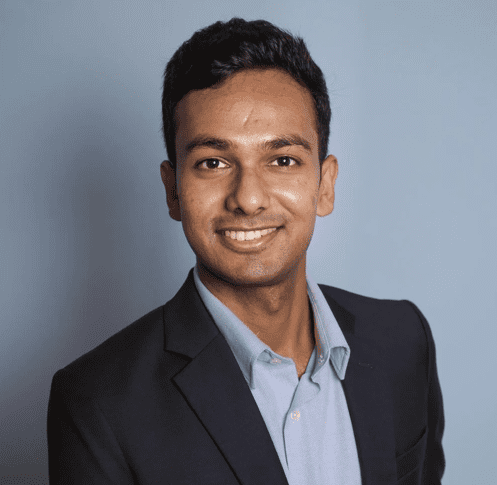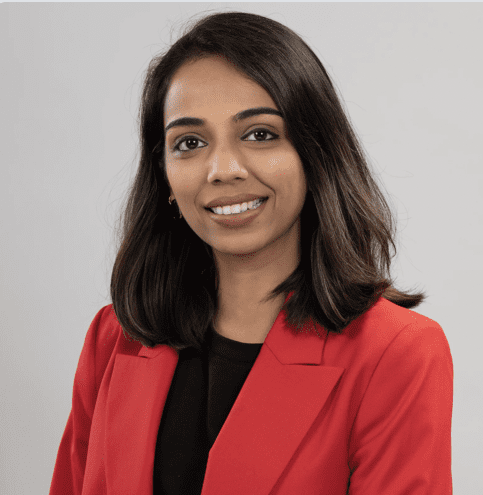The annual student-led India Conference at Harvard returns to campus for its 21st year on February 17 and 18. It will be the first time panelists and attendees will be fully in-person since the COVID pandemic began in 2020. Experts from various sectors including business, economy and culture will offer insight into India’s current landscape and future. We spoke to two of the four co-organizers, Ananya Chhaochharia (Harvard Kennedy School) and Ishaan Poddar (Harvard Business School) to understand the goals of the conference, and unpack this year’s theme, “India Rising.”
The Mittal Institute community can use the code “LMSAI” to receive 20% off of conference tickets. Purchase tickets below.
Mittal Institute: This is the 21st year of the India Conference – why is it a priority to continue to bring this event to the Harvard campus?
Ishaan Poddar: The India Conference, organized by the graduate students of Harvard University, is one of the largest student-run events in the United States today, and has attracted over 800 students, academics members of the Indian diaspora, business leaders and policy experts over the last two decades. We are excited to continue this legacy and bring this Conference for the 21st year running at a time when interest in engaging with India is at one of its highest levels ever. Over two days at the Harvard University campus, our goal is to bring perspective across a variety of disciplines to our audience that fosters thought-provoking dialogue, enables collaboration opportunities for those in the United States interested in engaging with India and vice versa, and finally helps create an understanding of the social and cultural context that guides our country forward.

Ishaan Poddar.

Ananya Chhaochharia.
Mittal Institute: Each year there is a specific theme – this year it is “India Rising.” How did you choose this theme, and what can one can expect from the conference?
Ananya Chhaochharia: The theme “India Rising” was chosen with the intent to demonstrate India’s ascent into a country of significance globally, whether it is with regards to geopolitics, business, or culture. As a conference hosted in the US, centered completely around India, we want to ensure the theme is all encompassing allowing us to forge engaging conversations for a global audience. The theme, therefore, is forward looking and aspirational. The topics for panels and direction of conversation maintains this intent and objective.
Mittal Institute: The event will host a number of sessions featuring nearly 50 speakers. Can you share more about the lineup, and how you solicited these impressive panelists? What topics will they explore?
Ananya Chhaochharia: On the first day at the Kennedy School, we want to focus on bringing expert opinions on pressing contemporary policy issues in India. We are collating a range of conversations from the role of media, climate and agricultural innovation, to education. Through panels like Foreign Policy and Geopolitics of India-US relations, we are highlighting the challenges to India’s global leadership. Our panelists include public servants, political leaders, activists, and academics alike. The importance of the discourse encourages these eminent speakers to travel all the way from India to be a part of the conference and interact with students as well as professionals from across the country. We have also incorporated networking events for participants of the conference to meet the speakers in a more intimate setting.
Ishaan Poddar: Day two will be held at the Harvard Business School campus, with a curation of keynotes, fireside chats and panel discussions diving deeper into how Indian enterprises have played a pivotal role in shaping the country today. Prominent speakers include, Mr. Anil Agarwal (Chairman, Vedanta Resources), Ms. Radhika Gupta (CEO, Edelweiss Asset Management), and KTR (Former IT Minister, State of Telangana). Our goal is to lay out opportunities that individuals and companies both, within and outside India, have to be a part of the country’s growth story over the next decade. Themes of conversations include entrepreneurship, investing, climate and most importantly the evolving regulatory landscape.
A full line of speakers can be found here: https://indiaconferenceharvard.com/speakers.html
Mittal Institute: What is something you’re most excited for with the conference?
Ishaan Poddar: I am excited about the collaboration possibilities created by virtue of all our speakers and participants coming together fully in-person this year, the first time since the COVID-19 pandemic hit in 2020. We have a variety of initiatives to allow people to meet and interact, even before the conference begins this February – first, the Conference app allows individuals to search for other attendees based on their interests and schedule coffee chats prior to the event; second, besides panel discussions we are also organizing smaller “Know-Your-Speaker” breakout sessions for interested participants to get the speaker’s feedback on particular topics; and finally, we have organized a networking cocktail on Sunday, 18 February, for participants to connect with each other and celebrate the two-day event.
I am excited about the collaboration possibilities created by virtue of all our speakers and participants coming together fully in-person this year, the first time since the COVID-19 pandemic hit in 2020.
Mittal Institute: Hosting an event like this requires much logistical support and coordination. Can you talk about the students who are involved in bringing this event to life? Why did you personally decide to co-chair this year?
Ananya Chhaochharia: It is definitely a mammoth task to put together the India Conference but we are supported by a wonderful team of nearly 75 students from across all graduate schools at Harvard. The four chairs – Shruti Agarwal (HBS), Taniya Bajaj (HKS), Ishaan and I – were selected back in April 2023 and put together the team within the first month of the fall semester. For me, leading the conference is a small avenue to bring together our community and deliberate on relevant subjects we collectively care about. I want to use this relevant platform to highlight the successes of India and the barriers to our growth. Through curated conversations we can influence the future leaders of our country and provide deep insights on being effective changemakers.
